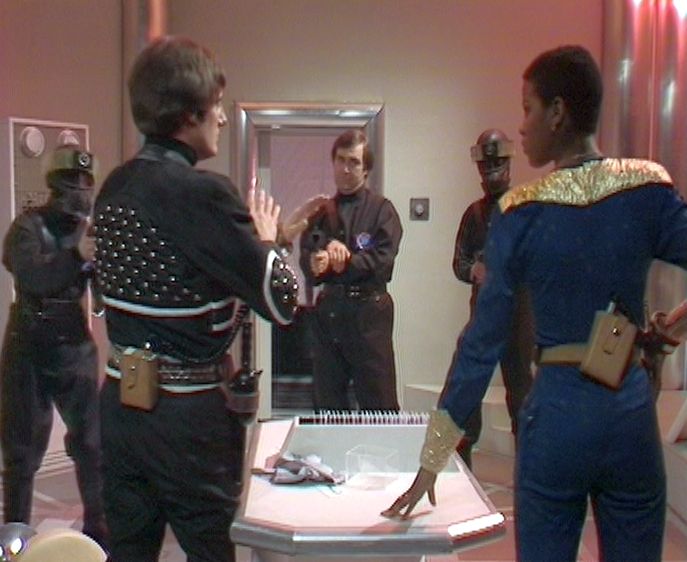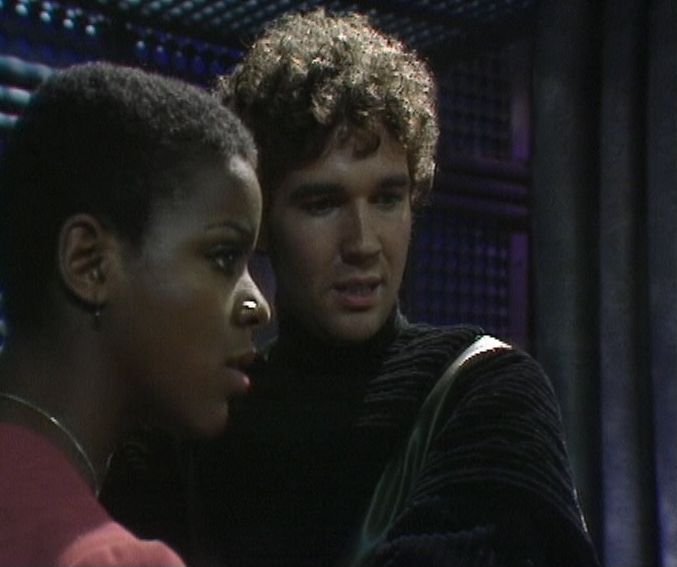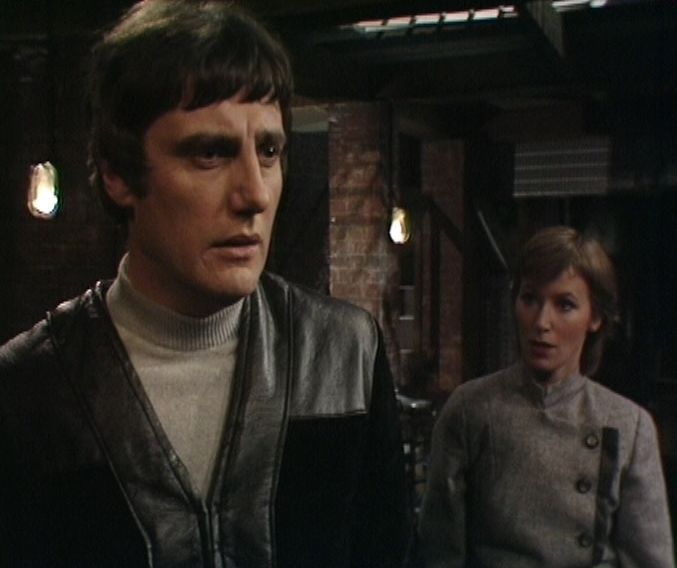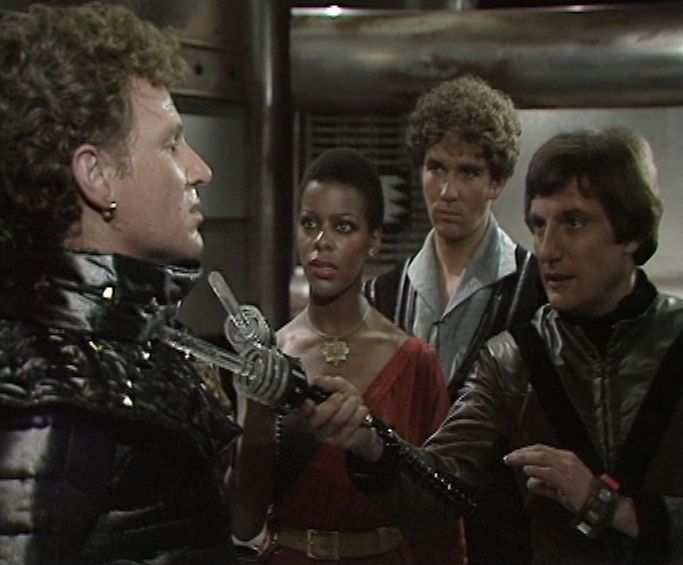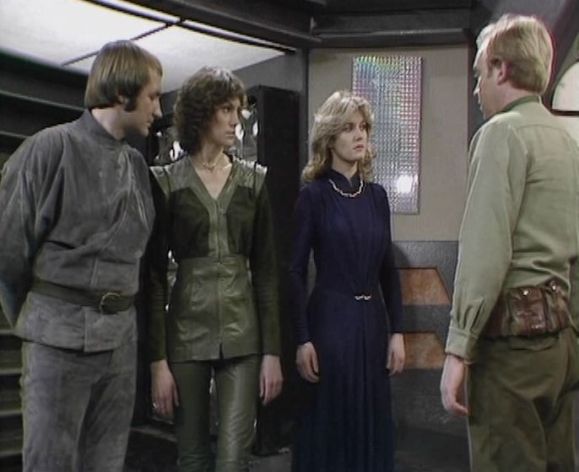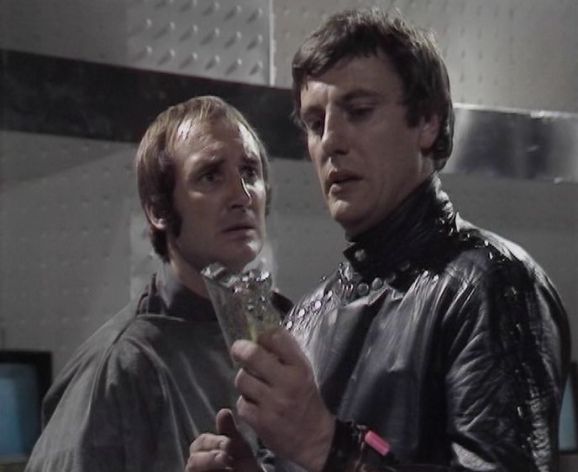
As is probably well known, Terminal was due to be B7‘s final episode, but the show was granted a last-minute reprieve by BBC bigwigs who had apparently enjoyed the series so much they asked for an announcement to be broadcast over Terminal‘s end credits stating that the series would return. Which came as something of a surprise to the cast and crew.
Having said that, it’s easy to see that Terry Nation crafted the script in such a way as to make a fourth series eminently possible. Terminal ends with Blake and Servalan apparently dead (although both make a miraculous comeback in S4) and the Liberator destroyed (which doesn’t) but everyone else is alive and kicking. But even if it’s not the final end it’s still an ominous, unsettling installment. Paul Darrow’s performance (as well as the very brief return of Gareth Thomas) are the undoubted highlights and help to paper over some of the more glaring plot holes.
The main talking point has to be Avon’s bizarre behaviour. Terminal seems to look ahead to the increasingly paranoid man who’d lead the others through a number of misadventures during series four, losing just as often as winning. If Rumours of Death started to chip away at his air of invulnerability (by revealing that he was never as close to defrauding the Federation’s banking systems as he’d previously thought) then Terminal is another nail in his coffin. His obsession to find Blake has several consequences, the most serious is that it loses them the Liberator. Enroute to their destination Zen detects unidentified matter in their path – he recommends going around it (“the consensus of computer systems favour a course deviation to avoid contact. In this environment, it is prudent to treat any unexplained phenomenon as potentially dangerous”) but Avon is adamant – there will be no course deviation.
Why? It wouldn’t have cost them a great deal of time and would have been the prudent course of action. And Avon’s always been prudent – never willing to risk either his life or that of the Liberator unnecessarily. It’s tempting to think that Servalan’s operating a similar mental suggestion on Avon that we saw Blake suffer from in Voice from the Past. That would also explain his burning desire to find Blake, which also seems very out of character – he spent two years trying to get rid of him!
There is the possibility that Avon is motivated to find Blake purely because of the get-rich plan that Blake was offering, although that doesn’t really hold water either – surely Avon has the ability to create his own get-rich plans if that’s what he wants? And the Liberator is supposed to carry untold wealth anyway.
But for all the slight niggles about his motivation, the brief meeting between Avon and Blake is still magical. It may last only a minute or so but it’s a reminder that as good as Darrow’s been during S3, he’s not had an equal – like Thomas – to measure himself against.
BLAKE: Well, you certainly took your time finding me.
AVON: There didn’t seem to be any hurry. Anyway, I always said I could manage very well without you.
BLAKE: It must have been so dull having no one to argue with.
AVON: Well, now, there were times when your simple-minded certainties might have been refreshing.
BLAKE: Careful, Avon. Your sentiment is showing.
Before teleporting down to the planet (an artificial satellite called Terminal) Avon makes it quite clear to the others exactly how he feels about them. “I don’t need any of you. I needed the Liberator to bring me here so I had no choice but to bring you along, but this is as far as you go. I don’t want you with me. I don’t want you following me. Understand this: anyone who does follow me, I’ll kill them.” Not very friendly.
The obvious irony is that he does need them and despite the way he’s treated them they won’t just abandon him. It’s all done in a typically understated way – no loud declarations of friendship and loyalty – but it’s there all the same. Later, Avon explains to Servalan that he decided to do everything on his own as he felt it could be a trap – although she wonders if it had more to do with his desire not to share Blake’s mysterious treasure with them. He smiles, but doesn’t deny it (this is a nice moment, as it offers several different motivations for Avon’s actions).
Of course it all turned out to be a dream – Blake was never on Terminal and his image was created in Avon’s mind by some clever people working for Servalan. This is yet another of her hopelessly over complicated schemes to capture the Liberator (in one way it’s a good thing this’ll be the last time she’ll have to do this).
If Servalan’s once again rather surplus to requirements, there’s two moments when she earns her money. The first is when she tells Avon that Blake’s dead. She appears to be quite emotional – was this Pearce’s choice or as scripted, I wonder? And was it meant to imply Servalan’s sorrow at the death of a worthy enemy or (even though this seems unlikely) was she emphasising with the fact that the news would have upset Avon?
No prizes for guessing that the second is “Maximum Power!” as she finally gets command of the Liberator. But by now it’s a very sick ship as the cloud of unidentified matter has caused irreparable damage . It’s more than a little odd that neither Servalan or her underlings twig that something’s wrong – the whole ship’s covered with big gloopy blotches for goodness sake!
Her apparent death is an interesting moment – I wonder if they ever intended to keep her dead when S4 was being mooted. Probably not, as she was such a powerful character, but her overuse during S3 had been a problem and a fresh adversary could have been what the series needed.
Is it wrong that I find the death of Zen to be more upsetting than the death of Gan? Zen’s final words (“I have failed you. I am sorry”) always raises a sniffle and the slow disintegration of the Liberator is also mildly upsetting.
No story is ever perfect and the links (small men in monkey suits) help to keep this proud record going. But apart from them, and a bit of a mid-episode sag, there’s not much wrong with Terminal (if you can accept Avon’s odd behaviour).
As they watch the Liberator disintegrate, Avon and the others face an uncertain future ….




